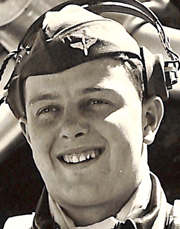LOCAL CADETS GET ADVANCE
Webster City and Stanhope Cadets to Advanced Flying School
With his graduation from the basic flying school at Goodfellow Field, San Angelo, Texas, Aviation Cadet David L. McNarney, of 520 Second street, Webster City, and Aviation Cadet Merle L. Sandal, of Stanhope, this week enter the last lap of their flight training before being commissioned as flying lieutenants in the fighting army air corps.
These cadets now move on to an advanced flying school where they will learn to handle the faster, more powerful planes of America’s growing sky armada. After completing the advanced course, they will be assigned to a combat unit or will become instructors.
At Goodfellow Field, where they “Say It With Flyers,” they received their first instruction in aerobatics, instrument, formation, cross country, and night flying. In ground school they were drilled in radio code, weather, and military law.
Typical of the air corps newest wartime training centers, Goodfellow Field, operating under a greatly stepped-up pilot training program, is turning out an ever increasing number of fighting airmen.
Cadet McNarney attended Iowa State college. He is the son of the late Col. Frank T. McNarney, and cousin of Brig. Gen. Joseph T. McNarney of the U.S. army air corps general staff. Cadet Sandal also attended Iowa State college. He worked on his father’s farm before entering the aviation school.
Source: Daily Freeman Journal, March 19, 1942
![]()
HDQRS, GULF COAST TRAINING CENTER, Texas—Mid-continent-spanning Gulf Coast Air Force Training Center Wednesday took on the teeming turbulence of an ant-hill, as class 42-E of fighting flyers received war wings at seven different pilot schools and prepared to stream forth to every continent under the sun.
Among the new wearers of wings were many flying officers and staff sergeants from Iowa, which contributed 37.
Get Commissions.
Included in the group were Lieut. David L. McNarney, 520 Second street, Webster City, and Lieut. Merle L. Sandal, Stanhope. McNarney is the son of the late Col. Frank McNarney and a nephew of Mr. and Mrs. Claude Phillips. Sandal is the son of Mr. and Mrs. Martin Sandal, living near Stanhope.
“Unusual” was the name for this class, which represents every state in the union.
For example:
Class 42-F—the sixth post-Pearl Harbor brood—was the largest in history (phraseology that has become standard every five weeks.)
Source: Daily Freeman Journal, May 20, 1942 (photo included)
![]()
CONFIRM AWARD
Awarding of the Order of the Purple Heart to Lieut. David L. McNarney of this city for gallant action in air service during which he was wounded was officially confirmed Friday morning in a radio broadcast. Lieutenant McNarney, who visited here with relatives recently while on furlough from duty in Alaska, has been recommended for the Distinguished Flying Cross for his part in a bombing raid on the Japanese held island of Kiska in the Aleutian islands. Anti-aircraft fire caught the medium bomber as it came over Kiska harbor and wounded both the pilot and McNarney who managed despite his wounds to bring the ship safely back to its base.
Source: Daily Freeman Journal, Webster City, IA - Feb. 5, 1943
![]()
AVIATOR BACK; HAS 2 MEDALS
Lieut. David McNarney on Leave From Aleutian Theater.
Back from service with the U.S. bomber squadron in the Aleutian island battle zone, Lieut. David L. McNarney, nephew of Mr. and Mrs. C. A. Phillips of this city, is visiting here on a short leave.
A recipient of the Purple Heart award early this year after being wounded by shrapnel from enemy gunfire in low altitude attacks on Japanese installations at Kiska, Lieutenant McNarney has been honored by the defense command of the army air forces with the air medal for heroism.
The citation for the air medal award presented by Major-General Butler read in part:
“Lieutenant McNarny was co-pilot of a medium bomber that pressed home a deck level attack on Japanese shipping in Kiska harbor. While approaching and leaving the target area the airplane was hit repeatedly by extremely heavy anti-aircraft fire. The pilot and Lieutenant McNarney were wounded, and, as the pilot’s injuries incapacitated him for further flying, Lieutenant McNarney flew the airplane back to the base and landed it safely. His actions were exceptionally courage’s, gallant and of extraordinary achievement.”
GETS PROMOTION.
Coincident with the award of the air medal, the flier was advanced to the rank of first lieutenant. After a leave spent here last January during which he recuperated from wounds received in the bombing mission, Lieutenant McNarney returned to the Aleutian theater and swung back into action.
During the recent stepped up campaign against the Japanese held bases, Lieutenant McNarney participated in many hard hitting raids. In 48 hours, during a especially active air “blitz,” the aviator flew on four separate missions. At the state of the battle for Attu, he was held in a reserve squadron for the first six days before being granted his leave to return to Iowa. He expects to be transferred to another theater of action upon completion of his current leave.
Source: Daily Freeman Journal, June 5, 1943
![]()
Notes:
David Lawrence McNarney was born Oct. 1, 1920 to Frank Thomas and Florence Phillips McNarney. He died Nov. 19, 1968 and is buried in Florida Memorial Gardens, Rockledge, FL.
Source:
ancestry.com
![]()

